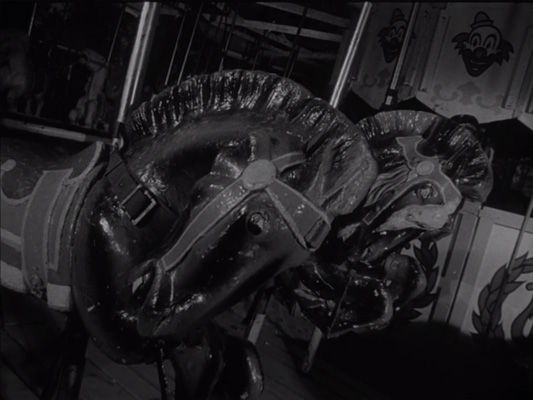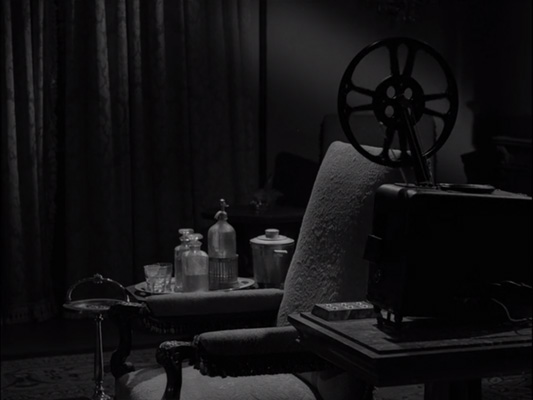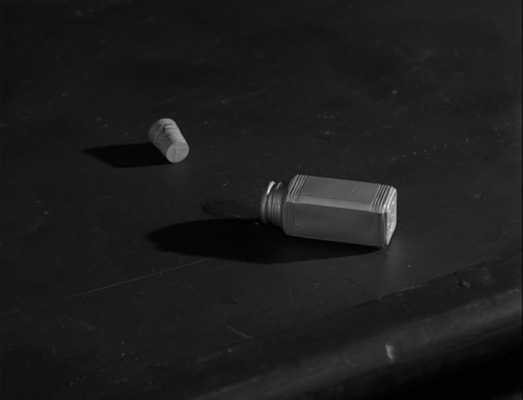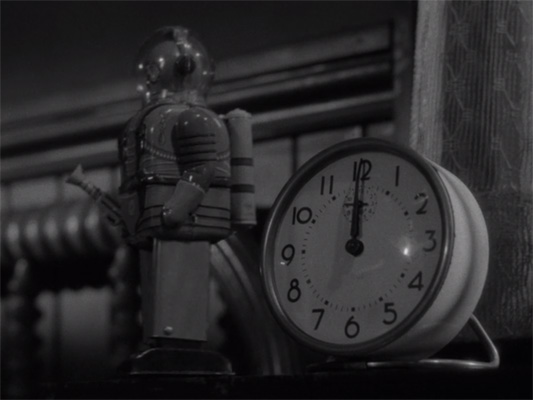
directed by Robert Stevens
written by Rod Serling
starring Gig Young
with Frank Overton
music by Bernard Herrmann
Friday, October 30, 1959, 10 PM EST on CBS.
This keeps going through long draft after draft because I keep lapsing into “explaining” instead of “saying.” And explaining is a spiral, at least when there’s nobody in the room with you.
Bullet points are more like me than paragraphs. Let me alt-0149 my way through this. I’m just going to post my original notes (embellishing when it strikes me), and then I can be done with it and go on to the next episode, finally.
• Something’s always amusing to me about the way Serling says “superstition” in the intro.
• This is a very lovely episode that doesn’t stick the landing. I suppose it fits exactly in the mold I talked about with the first episode: we go to a true but uneasy place, and then come up with a scheme to tame it. This time the defensive scheme is asserted with more force than usual. It’s surely because the script was more loaded than usual for Rod. If ever an episode deserved the trademark ambiguous ending, it was this one. Instead, Serling makes a definite claim… and it’s the conservative authoritarian one.
• It’s a dream. Sloan’s rational mind, his social self, is 36, but his memories are unaged. In a dream, this divide plays out as a crisis. That’s my basic reading.
• From the beginning it’s clear that the eventual anti-memory moralizing will be wrong. Sloan transitions into mysterious time travel from an outwardly totally customary grown-up distanced nostalgia. He hasn’t come here quixotically to specifically “recapture” anything. The pleasure he takes in the ice cream, or in talking to little Ronnie Howard about marbles, is not based on regression. It’s just a grown-up’s pleasure, and depicted as such. The sermon at the end might as well be anti-vacation.
• When he leaves the shop, and the camera lingers behind, and then the counterman goes to knock for Mr. Wilson, we know something spookier than usual is going on — this is for the audience, not the protagonist, even though this is his journey through subjectivity. The show is of two minds about how universal this story is.
• It’s a dream, but I don’t think Serling consciously understands that, so his script exhibits the same tensions and confusions as the character. Which half to endorse? Which half is “me”? Rod didn’t have a handle on it either, so this is all through a glass darkly.
• To me, this “Homewood” is just Main Street USA, Nifty Nineties Mickey, pre-packaged conventional “nostalgia” that has nothing to do with my personal past. But to Sloan, these are (purportedly) real memories! Hard to keep that fairly in mind. Is such “nostalgia” a good metonym for nostalgia? I think just the opposite. Well-established fantasy pasts are for people who are not at peace with their real pasts. So it’s a matter of audience taste as to whether this is an episode about memories or about “memories.” I experience it as mostly the former, until the ending, which is about the latter.
• “Dr. Bradbury.” This shout-out seems not to have been enough to appease Ray, who reportedly objected to Serling’s many near-plagiarisms, this episode among them.
• “Are you from around here?” asks the girl in the park. “No,” he says! Even the audience knows that this is the wrong answer. A weird wrong answer, indicative of emotional strictures. Even the audience intuits that his besuited adult “self” is only here as a symptom of repression. The natural dream would be one where he’s just a kid again, no problem. But he’s gotten too fervent about maintaining his artificial adult self to let that happen, even while dreaming. Even in his twilight zone he’s still fighting the fight.
• But after giving the wrong answer, he does then correct himself: “Well, what I mean is, I used to be, a long time ago.” This is a step toward reconciliation. It’s just after this that he notices his external “kid self” nearby. Again, if he were at ease, there would be no external kid self; he would just be himself in the dream. The kid self is an artifact of his alienation.
• His difficulty grasping that he shouldn’t bang on his parents’ door and shout “you mustn’t be frightened!” is unfortunate! But his difficulty grasping what’s going on is, I guess, exactly the nature of his internal split. He doesn’t understand the obvious, i.e., why his parents don’t know him, because he’s panicking. The gap between his intuition and his social knowledge is a kind of distrustful block that has accumulated. (His resistance also makes the pacing work out, albeit awkwardly. God knows why Serling put in two scenes about his parents not recognizing him.)
• Rod: “His resolve is to put in a claim to the past.” That’s just the problem. If he had no resolve or claim, this would all be his, because it already is. Does Rod know that? He almost knows it, I think. He knows enough to be skeptical of attempts to “put in a claim.” But he thinks it’s because the claims will always be denied. In fact it’s because they’re so superfluous that they create the problem in the first place.
• Much of this episode is actually an artistically satisfying depiction of my experience in semi-lucid dreams when the rational mind notices the irrational mind’s doings and starts making stupid simple-minded plans: “I ought to make the most of this, while I can!”
• Shouting at his own innocence: “I won’t hurt you! I won’t hurt you! I just want to tell you something!” until he injures both halves of himself. “Don’t let any of it go by without enjoying it!” A purportedly honorable message to deliver but actually futile, panicky, meaningless. These are good, apt images of the rational mind, the struggle for struggle’s sake.
• And then the moment when his panic needs to recognize itself as a kind of emotion after all, the moment through which psychological reconciliation will flow, beautifully portrayed as a dimming of the light and movement of the previously blissful external world. Suddenly he flows into what’s outside him, and perceives a strange, heavy procession. That’s a good, emotionally real catharsis; impressive stuff for prime-time TV.
• “I only wanted to tell you that this is the wonderful time for you. That’s all I wanted to tell you. God help me. That’s all I wanted to tell you.” His commitment to this purposeless “positive thought,” instead of to his own actual feelings, winding down like the merry-go-round, as the energy flows out of it and he recognizes himself.
• If we could stop the show here this is almost a masterpiece…
• But then NO!!!! Deus ex machina where none was needed. A somber lecture from “dad,” who, now that the spell is broken, both recognizes Martin and immediately gets back on the horse of pushing him away from his own past. Done up with all the standard pomp of TV moral education, very obviously our “good hard wise true thought” for the night. This is all artifice from a writer who doesn’t understand what he’s playing at. What he’s giving us here is actually a recipe for being the kind of person who has this dream in the first place.
• Now comes a lot of contrived reframing of his motivations over the whole episode. “I had to come back and get on the merry-go-round…” That’s a lie, and we should know, because we just watched it!
• “You’ve been looking behind you, Martin.” I firmly reject this. He’s been refusing to look behind him for years, at great cost to himself, and now, finally, just took a short walk to sample the ice cream while his car was getting serviced. And sure enough, next thing you know, it’s time for a sermon from “dad” and the wistful, stoic resolve not to do this so much.
• I hardly need to devote a bullet point to explaining why I, personally, at 36 and at where I am in my life, might be accused of projecting this. But I’m not; it’s right there on the screen. Just watch it twice in a row and you’ll feel how thoroughly the end sells out the beginning.
• Where do TV morals come from? Why are we all watching and getting something out of stories that end with lessons learned? Because we all like lectures? Apparently, in fact, we do.
As though a half-hour TV show could possibly be a way of being changed, perfectly in sync with the drama. Ha! “Lessons learned” are satisfying exactly because we’re not changed; we’re just cyclical beings. A lesson-story is appealing because it’s a performance of a pattern that we already experience daily, over and over — a thought-narrative that purports to have “growth” built into it, because we want to reward ourselves with that good feeling of “maturing.”
In this case: “Ah, memories, so faraway and painfully sweet. … But, you know, we think about memories too damn much, and what good does it do? From now on we’ll be grown up and look toward the future.” Repeat ad infinitum.
It’s commitment to this pattern that makes the memories grow so faraway; it’s what makes sweetness grow painful.
• Funny that his rearrival in The Present Day at the end is into a 50s jukebox wonderland that to us is just as thoroughly conventional a phony nostalgia as the place he just returned from. He’s as Back to the Future from Back to the Future as we are to Back to the Future II, if you follow.
• Speaking of which: the time-travel loop by which he injures his own past leg and now carries it with him in the present is, as “confirmers” go, a pretty cool device. Even though, as I said, I completely reject the moral implications.
• The final sum-up is bizarre, as Serling doubles back on himself yet again and attempts to articulate the full scope of his untenable position, and in the process gets further and further from describing anything we actually saw. It’s frankly hard for me to believe that anybody watching wouldn’t feel what I feel, as this episode winds down: that it is very obviously packing itself away dishonestly.
Martin Sloan, age thirty-six. Vice President in Charge of Media.
Successful in most things, but not in the one effort that all men try at some time in their lives:
trying to go home again.
And also, like all men, perhaps there’ll be an occasion — maybe a summer night some time —
when he’ll look up from what he’s doing and listen to the distant music of a calliope…
and hear the voices and the laughter of the people and the places of his past…
And perhaps across his mind there’ll flit a little errant wish:
That a man might not have to become old…
never outgrow the parks and the merry-go-rounds of his youth.
And he’ll smile then, too, because he’ll know that it is just an errant wish…
Some wisp of memory — not too important really.
Some laughing ghosts that cross a man’s mind…
That are a part… of The Twilight Zone.
Yeesh. Rod, I get who this is about, and it’s not me after all.
You didn’t have to smoke yourself to death at 50. You were allowed to go back to Binghamton if you wanted. You were certainly allowed to stop being Vice President in Charge of Media, if it stressed you out, and reportedly it did. (And god knows Gig Young didn’t have to go where he went.)
Let’s try to remember that ice cream sundaes are a valid alternative.
• Okay, I’ll admit it. I do have one glimmer of hope for ambiguity here. The phrase “not too important really” seems like it’s crying out to be doubted — why else is it in there? So is it possible to read this as skeptical? Is the seeming decisive tone intentionally hollow? I don’t know if we can get all the way there. Your thoughts are appreciated.
• This is our second original score by Bernard Herrmann and another one that he knocks out of the park (so to speak). Really beautiful music in his Vertigo mode, but even more than that, an incredibly sensitive reading of the material. That moment when the lights go down and the baroque chords start processing gives me dramatic chills.
I get the impression of Herrmann as having understood what was going on here better than Serling did. In fact I find that listening to the score by itself, I can experience the catharsis as the “correct” one. I imagine the episode all the way up until the father arrives at the merry-go-round… then I have other stuff happen. Stuff that suits the situation and isn’t a good hard wise true thought. You can imagine the kind of thing. Anyway the music supports it just fine.
• I’d tell you what I imagine happening, but it’s for each of us to script our own pattern.


